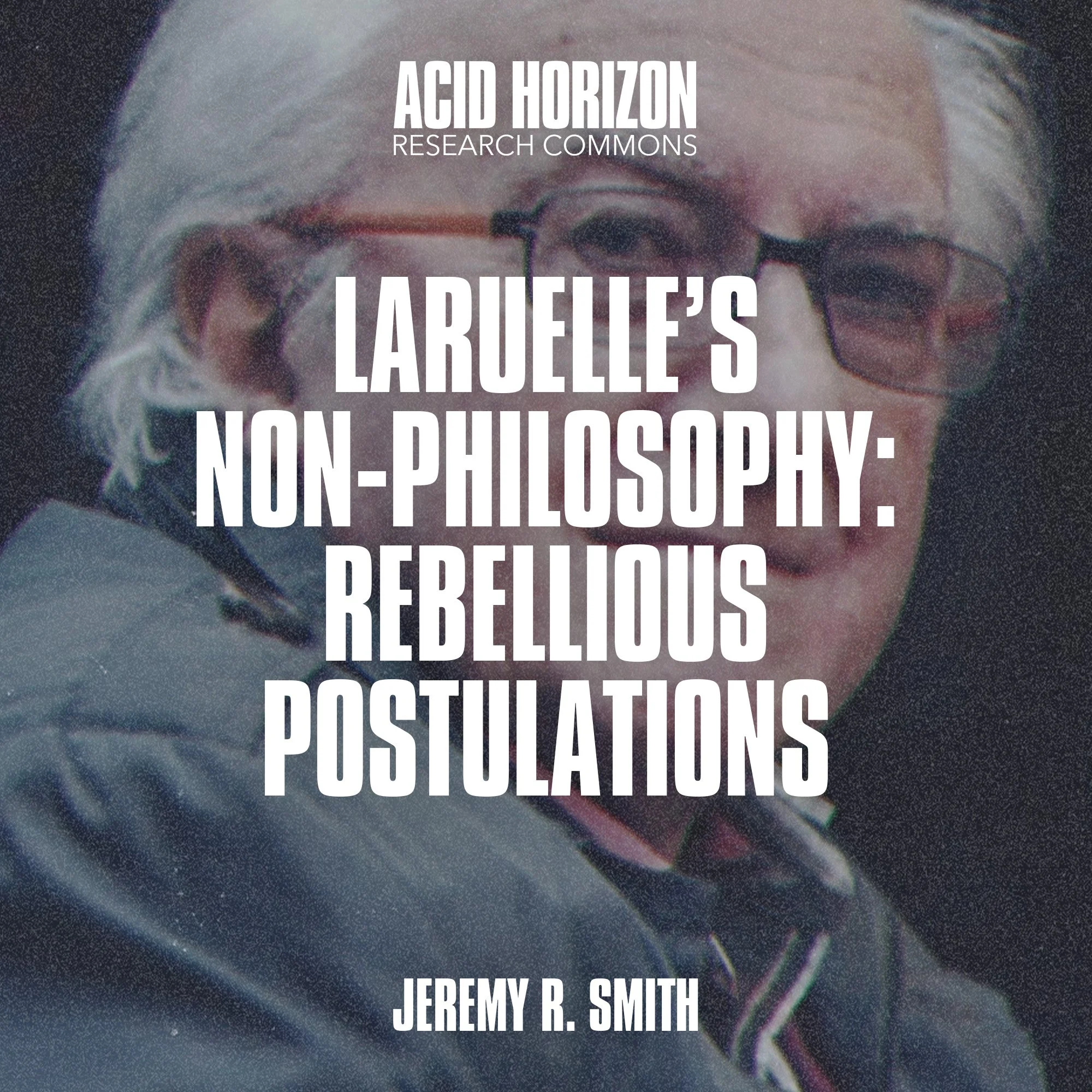 Image 1 of 1
Image 1 of 1


François Laruelle and Non-Philosophy (Cluster 1): Rebellious Postulations
Taught by Jeremy R. Smith (Acid Horizon Research Commons)
For over five decades, François Laruelle has advanced a radical proposition: “Man is not made for philosophy, but philosophy is made for man.” This 4-week seminar introduces participants to non-philosophy—Laruelle’s insurgent project to displace philosophy’s claim to dictate the terms of thought and life. Rejecting “philosophical sufficiency”—the idea that philosophy alone can determine or co-determine existence—non-philosophy reorients theory and practice toward human ends that escape philosophy’s self-appointed authority.
In Rebellious Postulations, the first of three clusters dedicated to Laruelle’s complete corpus, we will trace the genealogy of non-philosophy from its early confrontations with Deleuze, Derrida, Heidegger, and Nietzsche, through its elaborations on the “human philosophy” of the ordinary man, to its development as a “first science” and unified theory of philosophy and science. Participants will examine non-philosophy’s intersections with ethics, politics, Marxism, psychoanalysis, aesthetics, ecology, theology, and mysticism, as well as its later forays into quantum thought and genericity alongside Badiou and Meillassoux.
Special attention will be given to Laruelle’s influences (Feuerbach, Michel Henry, Félix Ravaisson), his contemporaries (Gilles Grelet, Anne-Françoise Schmid, Serge Valdinoci), and the work of students and interlocutors (Ray Brassier, Alexander Galloway, Katerina Kolozova, John Ó Maoilearca, Anthony Paul Smith, among others). Alongside English translations, we will work with untranslated French texts—many accompanied by the instructor’s own translations—to encourage critical engagement that moves from reading into practice.
This course will be of interest to philosophers, theorists, artists, and researchers looking to situate non-philosophy in a broad, interdisciplinary context, including media studies, ecology, religious studies, postcolonial theory, and Afropessimism. Together we will ask: What is non-philosophy? And more importantly—what can non-philosophy do?
Instructor Bio: Jeremy R. Smith is an independent researcher and translator, co-founding member of Oraxiom: A Journal of Non-Philosophy, and translator of Laruelle’s Theory of Strangers: Science of People, Democracy, and Non-Psychoanalysis (forthcoming, Edinburgh University Press).
Course Schedule
All sessions on Wednesdays at 7PM EST via Zoom
Session 1: Wednesday, October 8 — What is Non-Philosophy?
Introduction to Laruelle’s project and its challenge to “philosophical sufficiency.”Session 2: Wednesday, October 15 — Nietzschean Writings
From Nietzsche contre Heidegger to political materialism and machinic thought.Session 3: Wednesday, October 22 — Human Philosophy and the Right to Rebel
The “ordinary man,” homo ex machina, and resisting philosophical authority.Session 4: Wednesday, October 29 — Non-Epistemology
First science, unified theory, and the transcendental in non-philosophy.
Students will receive permanent access to recorded lectures, translations, supplementary readings, and discussion materials.
Taught by Jeremy R. Smith (Acid Horizon Research Commons)
For over five decades, François Laruelle has advanced a radical proposition: “Man is not made for philosophy, but philosophy is made for man.” This 4-week seminar introduces participants to non-philosophy—Laruelle’s insurgent project to displace philosophy’s claim to dictate the terms of thought and life. Rejecting “philosophical sufficiency”—the idea that philosophy alone can determine or co-determine existence—non-philosophy reorients theory and practice toward human ends that escape philosophy’s self-appointed authority.
In Rebellious Postulations, the first of three clusters dedicated to Laruelle’s complete corpus, we will trace the genealogy of non-philosophy from its early confrontations with Deleuze, Derrida, Heidegger, and Nietzsche, through its elaborations on the “human philosophy” of the ordinary man, to its development as a “first science” and unified theory of philosophy and science. Participants will examine non-philosophy’s intersections with ethics, politics, Marxism, psychoanalysis, aesthetics, ecology, theology, and mysticism, as well as its later forays into quantum thought and genericity alongside Badiou and Meillassoux.
Special attention will be given to Laruelle’s influences (Feuerbach, Michel Henry, Félix Ravaisson), his contemporaries (Gilles Grelet, Anne-Françoise Schmid, Serge Valdinoci), and the work of students and interlocutors (Ray Brassier, Alexander Galloway, Katerina Kolozova, John Ó Maoilearca, Anthony Paul Smith, among others). Alongside English translations, we will work with untranslated French texts—many accompanied by the instructor’s own translations—to encourage critical engagement that moves from reading into practice.
This course will be of interest to philosophers, theorists, artists, and researchers looking to situate non-philosophy in a broad, interdisciplinary context, including media studies, ecology, religious studies, postcolonial theory, and Afropessimism. Together we will ask: What is non-philosophy? And more importantly—what can non-philosophy do?
Instructor Bio: Jeremy R. Smith is an independent researcher and translator, co-founding member of Oraxiom: A Journal of Non-Philosophy, and translator of Laruelle’s Theory of Strangers: Science of People, Democracy, and Non-Psychoanalysis (forthcoming, Edinburgh University Press).
Course Schedule
All sessions on Wednesdays at 7PM EST via Zoom
Session 1: Wednesday, October 8 — What is Non-Philosophy?
Introduction to Laruelle’s project and its challenge to “philosophical sufficiency.”Session 2: Wednesday, October 15 — Nietzschean Writings
From Nietzsche contre Heidegger to political materialism and machinic thought.Session 3: Wednesday, October 22 — Human Philosophy and the Right to Rebel
The “ordinary man,” homo ex machina, and resisting philosophical authority.Session 4: Wednesday, October 29 — Non-Epistemology
First science, unified theory, and the transcendental in non-philosophy.
Students will receive permanent access to recorded lectures, translations, supplementary readings, and discussion materials.

